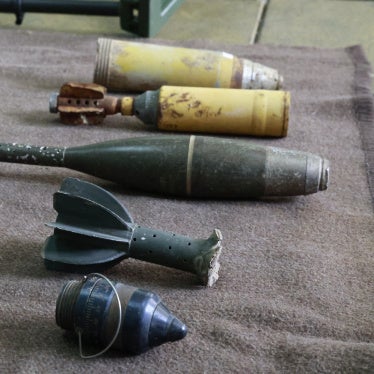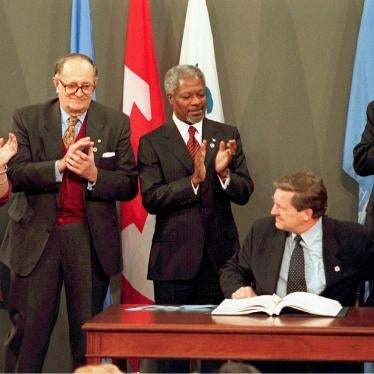Testimony of Bonnie Docherty
Thank you for the opportunity to testify before your committee today on Bill S-10.
Implementation of the Convention on Cluster Munitions has personal resonance for me because I have done extensive field research on the effects of these weapons on civilians. I have interviewed dozens of victims in Afghanistan, Iraq, Lebanon, Israel, and Georgia, who have been harmed by cluster munitions at the time of attack or afterward.
One story from Lebanon particularly stands out for me. A 14-year-old boy had been throwing pinecones at his 12-year-old brother Rami `Ali Hassan Shebli. Rami picked up something to throw back, but it was a submunition. A neighbor yelled at Rami to put it down. As Rami reached behind his head to toss the submunition away, it exploded, killing him instantly. We arrived at the scene two hours later, and deminers detonated 15 nearby submunitions during our visit. We also observed two men shoveling Rami’s final remains into a box. After they left, his finger remained on the ground.
This story and many others underlie my grave concerns about Bill S-10. The bill has some good elements, such as its absolute prohibitions in Section 6. But it contains major loopholes that would allow Canadians to assist with the use of cluster munitions that could kill other civilians like Rami.
Most of the problems with Bill S-10 stem from Section 11. For example, under Section 11, Canadian military commanders may direct or authorize the armed forces of another state to use cluster munitions. They may also “expressly request[]” the use of cluster munitions by a state not party if the choice of munitions is not within Canada’s “exclusive control.” Canadians on secondment to states not party may even use cluster munitions themselves. Each of these activities directly contravenes the object and purpose of the convention—to eliminate cluster munitions and the suffering they cause.
Section 11’s loopholes also run counter to the letter of convention. Article 1 prohibits assistance to anyone with any banned activity under any circumstances, which should encompass joint military operations. Article 21 should be understood as a clarification that the article allows mere participation in joint military operations, instead of as a qualification that creates exceptions during such operations. An alternative interpretation of Article 21 would make the article internally inconsistent. It cannot logically be read to require Canada to discourage use (under paragraph 2) and at the same time allow Canadians to encourage use, as permitted by the bill.
At least 35 states, including 11 NATO members, have said that Article 21 does not create exceptions to the absolute ban. Norway explained in a commentary to its legislation that “the exemption for military cooperation does not authorize states parties to engage in activities prohibited by the convention.” We recommend the Senate amend the bill by deleting the subparagraphs under Section 11 and changing the chapeau to specify that mere participation in joint military operations with a state not party is allowed. New Zealand and Guatemala have both adopted this approach.
Section 11 allows for Canadians to contravene the convention’s ban on assistance in two other ways. First, it seems to allow Canadian personnel to direct or authorize the stockpiling of cluster munitions by states not party on Canadian territory. At least 28 states, including ten NATO members, have stated that the convention bans the hosting of foreign stockpiles. To address this problem, we recommend that Section 11 be amended as described above and encourage the insertion of an explicit prohibition on facilitating foreign stockpiling in Section 6.
Second, Section 11 permits Canadian personnel to assist with the transit of cluster munitions by a state not party through Canadian territory. At least 31 states, including 10 NATO members, have said they believe the convention bans transit. Three states, including Austria, Germany, and Switzerland, have explicitly banned transit in their implementation legislation. This shortcoming could be resolved by amending Section 11 as discussed and explicitly prohibiting transit in Section 6.
In conclusion, we encourage the Senate to add two elements to the bill that would allow it to implement the convention more comprehensively. We recommend the Senate insert an explicit, rather than implicit, prohibition on investment in cluster munitions. We also call on Canada to implement the convention’s positive obligations through legislation supplemented by other administrative measures. For example, the bill could include requirements that Canadian military personnel discourage use of cluster munitions and notify armed forces to which they are seconded of Canada’s obligations under the convention.
Thank you again for the opportunity to testify today. Our written submission provides more details on our position, and I would be happy to answer any questions at the appropriate time.
Testimony of Steve Goose
Thank you for the opportunity to testify Madame Chair. In addition to my position at Human Rights Watch, I am one of the founders of both the Cluster Munition Coalition (CMC) and the Nobel Prize winning International Campaign to Ban Landmines (ICBL). I currently serve as the chair of both the CMC and ICBL. I was deeply involved in the development and negotiation of both the Convention on Cluster Munitions and the Mine Ban Treaty, as well as two other international instruments, the ban on blinding lasers and the protocol on explosive remnants of war. Most of my time now is devoted to monitoring and promoting full compliance with and implementation of the Convention on Cluster Munitions and the Mine Ban Treaty.
I would also like to note that I have had an excellent, very close, and cooperative working relationship with numerous Canadian officials for nearly two decades, from Foreign Affairs and National Defence and CIDA, from ministers and ambassadors on down.
So I regret to say that this bill is the antithesis of my experience with the Canadian government – an experience characterized by Canada’s bold leadership, creative diplomacy, and above all a commitment to humanitarian values, and a determination to do everything possible to prevent and reduce civilian suffering during and long after armed conflict.
Our view at Human Rights Watch is that this draft legislation is contrary to the Convention on Cluster Munitions, and could well undermine the integrity and long-term success of the convention. This view is shared by key States Parties, such as Norway, as well as the International Committee of the Red Cross, and UN agencies, as we heard at the Third Meeting of States Parties in Oslo last month, where the dangers of this draft legislation were the hot topic of conversation in the plenary and on the margins.
This convention is far too important to be put at risk by seriously flawed domestic implementation legislation. From a humanitarian perspective, in terms of protection of civilians, this convention has far-reaching potential. It is largely a preventative instrument, aimed at ensuring that the huge existing global stockpiles (many millions of cluster munitions with billions of submunitions) never get used. The convention is aimed at avoiding a global humanitarian crisis that could far out-strip that caused by landmines in the 1980s and 1990s, the landmine crisis that Canada showed unparalleled leadership in addressing.
The best way to ensure the success of the Convention on Cluster Munitions is to stigmatize the weapon, as we have done successfully with antipersonnel mines. We have had great success in stigmatizing cluster munitions thus far as well, with most of the world having signed the convention, with strong, widespread condemnation of the two most recent instances of use (in Syria and Libya), and with many of the countries that have not yet joined already moving toward a ban, including the United States.
Regrettably, the draft Canadian legislation works against the stigma and against the comprehensive ban dictated by the convention. A straight reading of the legislation, and Section 11 in particular, indicates that it is aimed at facilitating future use of cluster munitions by others, as well as allowing stockpiling on and transit through Canadian territory, and even envisioning future use by Canadian forces seconded on joint operations.
It may not be Canada’s intent to undermine the Convention on Cluster Munitions, but with these provisions, the legislation could have that effect. It is understandable that Canada desires to offer legal protections to Canadian armed forces during joint operations with non-signatories, but this legislation goes way too far – and unnecessarily so.
Canada’s approach to this in the context of the Mine Ban Treaty, which allows for participation in joint operations as long as the participation “does not amount to active assistance” in a prohibited activity, would suffice for the Convention on Cluster Munitions as well.
Several other nations have adopted this approach for the Mine Ban Treaty and the Convention on Cluster Munitions. Canadian officials have told us that the Mine Ban Treaty approach is not sufficient for the cluster convention for the simple reason that they believe the US is more likely to use cluster munitions than it was (or is) landmines. This is flawed reasoning in many ways, including that the US is moving toward a virtual ban on cluster munitions by 2018. But more to the point, Canada’s emphasis should be on preventing use by others, on stigmatizing the weapon, not on making it easier for others to use it, not on facilitating use. The draft legislation sends the clear message that Canada expects the US to use cluster munitions in the future.
In fact, given the strength of the stigma already in place, we believe it is unlikely the US will ever use cluster munitions again, and it is extremely unlikely that Canada would ever resort to taking advantage of the loopholes provided in the legislation, extremely unlikely that Canadian forces would assist with the use of cluster munitions, much less use the weapons themselves while on secondment. Thus, the loopholes are not only objectionable in the extreme, but also unnecessary.
We have criticized two other nations’ implementation legislation, most notably Australia, and to a lesser extent the United Kingdom, but Canada’s has earned the dubious distinction of being the worst.
We know that some States Parties are concerned not only about the effect of Canada’s legislation on the Convention on Cluster Munitions, but also the potential negative impact on treaty law as a whole: setting a precedent of signing and ratifying an international instrument, but adopting national implementing legislation clearly at odds with it.
To summarize and conclude, the objectionable provisions in Section 11:
- Are contrary to the letter and the spirit of the convention;
- Could undermine the effectiveness of the convention as a humanitarian instrument;
- Are unnecessary and wildly excessive in terms of allowing Canada’s continued participation in joint operations with non-signatories, and offering legal protections to Canada’s armed forces during joint operations;
- Will undercut Canada’s leadership position in the Convention on Cluster Munitions, and the Mine Ban Treaty, and on humanitarian issues and international law more generally.
Human Rights Watch strongly urges the Senate to amend the draft bill in line with the specific recommendations in our written testimony, which my colleague Bonnie Docherty will now summarize.
Thank you.








